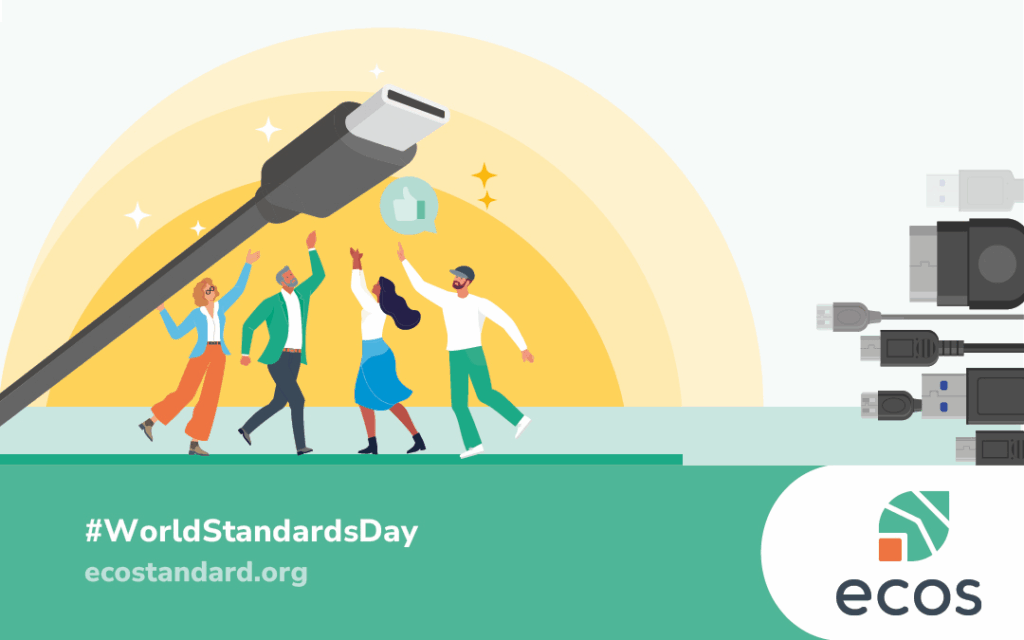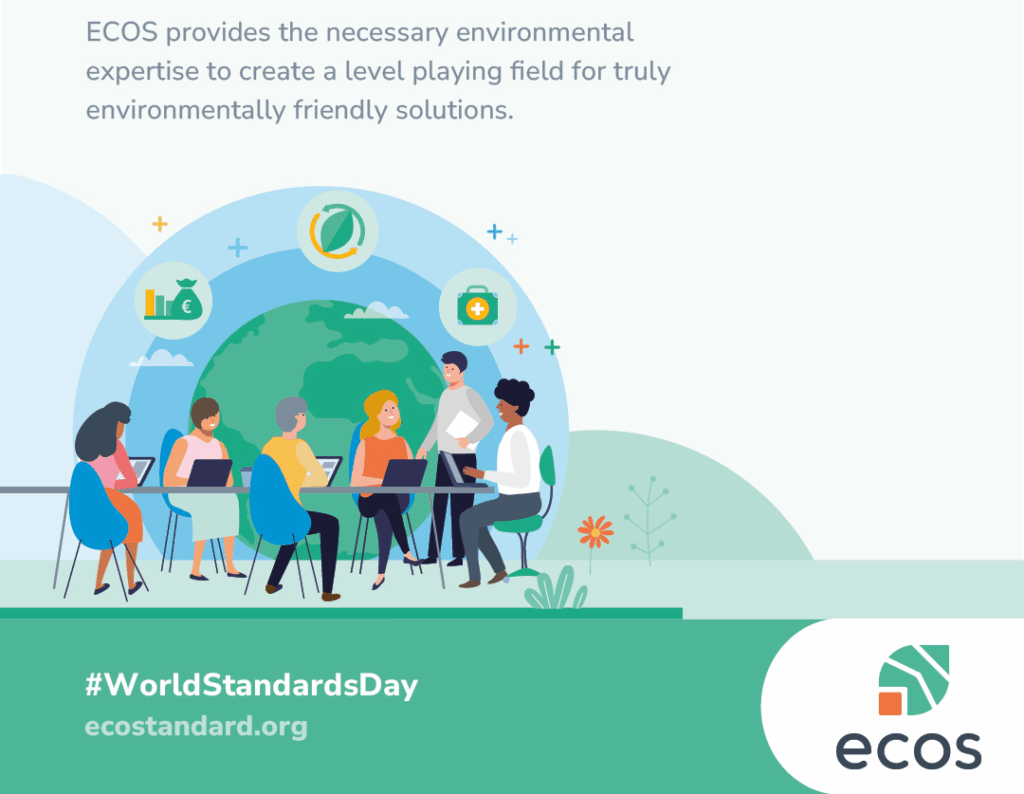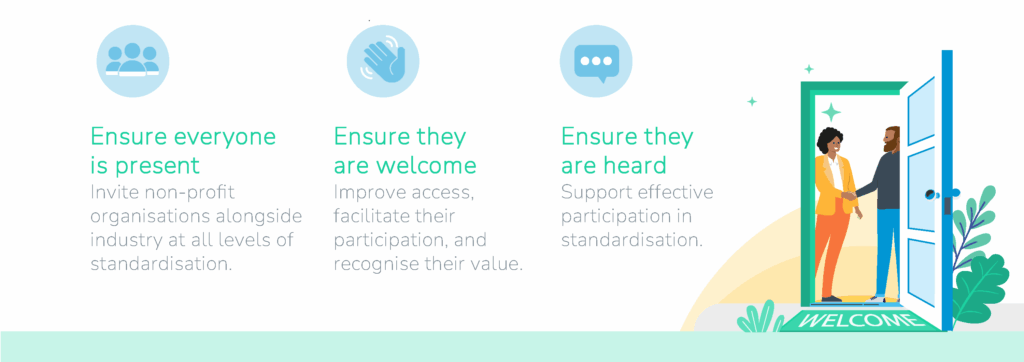Standards need to work for everyone – here’s how we do it
World Standards Day this year focuses on the power of partnership and the impact of working together. The development of standards can enable meaningful collaboration between industries, governments, and civil society, but a lack of representation of diverse and relevant expertise from civil society organisations risks the adoption of standards which may not be fit for purpose.

Everything is impacted by standards — from the repairability of mobile phones, or the energy performance of fridges, to the materials used in products. Introducing common rules and processes can help to facilitate trade, promote more climate-friendly products, and support the implementation of legislation and international agreements, such as the Paris Agreement.
Standards need to work for everyone
Standards can make a big impact on the environment. The EU’s 2025 Annual Union Work Programme for European Standardisation identified that 50% of standardisation actions are needed to support the green transition.
Bringing the environmental perspective into the development of standards can make production, consumption, and innovation more sustainable and responsible, as well as steer industries towards investments in innovations that better respond to societal needs and public policy objectives.

To ensure that standards benefit everyone, standardisation systems need checks and balances to prevent monopolies by large companies that predominantly focus on their own private interest. The increasing use of standards also requires new expertise, particularly when providing solutions for the green transition. Environmental organisations, such as ECOS, bring unique and valuable technical perspectives, which may otherwise be unavailable – or overlooked – by standards-makers.
Fortunately, some standardisers are moving towards more inclusiveness to create stronger and more environmentally sound standards.
European standards lead the way – but more needs to be done
EU law mandates that small businesses, environmental organisations, consumers, and trade unions must be consulted when certain European standards are developed. This system is unique in the world of standardisation, and the Standardisation Regulation’s approach to underrepresented stakeholders marked a significant step forward in promoting inclusiveness within standardisation.
Consumers, small businesses, environmental, and social organisations are granted a legally mandated seat at the table, in an effort to ensure that standards serve the public interest and are developed in more transparent and inclusive environments. As a result, a broader range of voices can make meaningful contributions to standards that underpin European policies.
But even with such a pioneering mandate for inclusiveness, the European standardisation system does not always effectively engage civil society – and the problem is even more acute in the case of national and international standardisation. This is particularly important because the development of European standards relies on the interaction between European, national, and international systems, even though not all levels enable effective participation of civil society organisations.
To participate in the development of standards firstly requires knowledge and human resources that many organisations simply cannot afford – unlike large companies that gain from participating in the system. Access conditions and fees are also a recurrent obstacle. Even when civil society organisations manage to overcome these barriers, they often cannot meaningfully participate in the process as they can only do so as an observer without voting rights.
ECOS: The environmental voice in standardisation
For 25 years, ECOS has been advocating for the environment in standardisation. During this time, we have channelled the environmental interests into more than 200 standards. Every year, we make over 100 technical contributions on standardisation across diverse sectors including energy, climate, construction, plastics, textiles, biodiversity, food, chemicals, or electronics. With access to more than 300 working groups across European and international standardisation organisations, we have unique expertise and are well poised to make a big impact.

We train and recruit a network of over 50 experts and, as well as our technical staff, providing the standardisation system with critical expertise that is current on the decline in standardisation. Here are just a few examples of how our environmental expertise helped improve standards:
- Without our involvement, screens in almost every home and office in Europe – such as those in your TV or laptop – might still contain unnecessary chemical flame retardants that can seriously impact health and are almost impossible to get rid of after they enter the recycling chain.
- Consumer electronics are also now improved thanks to our work. In 2025, the very first ecodesign rules on smartphones and tablets entered into force, meaning that these products will last longer, be easier to repair, and contain more information for consumers.
- A European standard on the circular design of fishing gear will help to reduce marine plastic, the second most common type of plastic item found in the sea, and the cause of over 10% of plastic pollution in our oceans. Without the contributions of ECOS, the outcome of these negotiations would have been very different.
When standards are developed inclusively and collaboratively, they can have a positive impact – but the European standardisation system is not set up to guarantee environmental ambition, which is why ECOS actively advocates to further improve inclusiveness in the standardisation system.
Take cement, for example: this ubiquitous (and very polluting) material could easily be decarbonised through new or updated standards – but new technologies that flourish in other parts of the world and could slash related emissions are blocked in the EU by out-of-date standards. Incumbent companies promote these standards to control the market in their favour, keeping greener solutions off the market. Environmental groups and innovative low-carbon cement companies in the EU are calling for a truly inclusive standardisation process, which can create a route to market for the most sustainable technologies, instead of obstructing them.
How to build a more inclusive standardisation system in the EU
The EU Standardisation Regulation is now up for revision, with the new proposal scheduled for 2026. This offers a critical opportunity to make the system more inclusive for environmental organisations and other societal stakeholders.

Here are our three musts for an inclusive standardisation system:
- Make sure everyone’s present:
Mandate involvement of small businesses, consumers, trade unions, and environmental organisations at all levels (EU, national, and international), alongside industry, with mechanisms to redress civil society’s unequal representation. - Make sure they are welcome:
Improve access conditions for civil society stakeholders in standardisation organisations at all levels, to facilitate their participation, enhance the recognition of their role, and add value in shaping inclusive standards. - Make sure they are heard:
Support for-purpose groups to allow their experts to be effectively involved in European standardisation.
We stand before a unique opportunity. Let’s make sure European standards work for businesses, while helping protect the environment and people’s health.
Learn more about standardisation and the vital role of civil society in the system:
- Read our response to the call for evidence on the revision of the EU’s Standardisation Regulation
- Check out our toolkit Best practices for including NGOs in the work of National Standardisation Bodies
- Learn more about our work on standardisation
- Get in touch – we will be happy to guide you and let you know how you can get involved.

 By
By  By
By 
